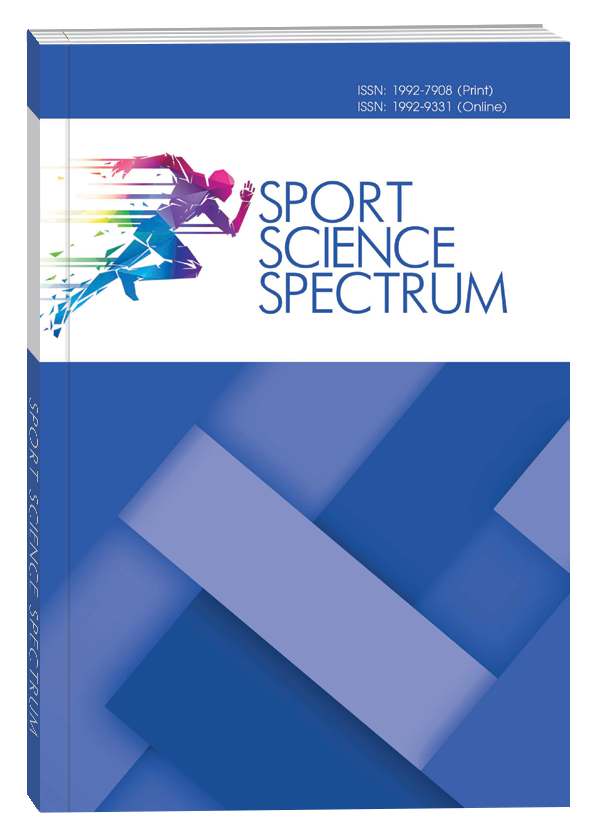THE ESSENCE OF VOLUNTEER ACTIVITY IN ADAPTIVE SPORTS
DOI:
https://doi.org/10.32782/spectrum/2024-2-15Keywords:
volunteer activity, adaptive sports, students, humanistically oriented societyAbstract
Since the onset of the war in Ukraine, the number of individuals with disabilities has increased. Consequently, the issue of their recovery, socialization, and reintegration into civilian life through the involvement in adaptive sports has become a pressing concern. The organization of training and competitive events for persons with disabilities, in consideration of contemporary circumstances, necessitates not only an expansion in the number of professionals who will engage with this demographic, but also the cultivation of a society that is morally and ethically oriented. The involvement of volunteers in the field of adaptive sports can prove to be a significant factor in addressing these challenges. In light of these considerations, an investigation into the function and significance of volunteering in adaptive sports, and the influence of this undertaking on the development of a society oriented towards humanistic values, becomes a pertinent research topic. The objective is to ascertain the function and importance of volunteering in adaptive sports for the development of a humanistically oriented society. The methodological basis of the study includes analysis, synthesis, generalization, comparison and contrast, methods of sociological research (questionnaires), and methods of mathematical statistics. Results. It has been established that the study of the discipline “Adaptive Sports” contributes to the formation of a humanistic society. Positive dynamics was found for each of the characteristics, namely, understanding of the need and safety of participation in the training and competitive process of people with disabilities, as well as the importance of conducting training sessions together with practically healthy people. After studying the discipline, 60.2% of respondents indicated their readiness to train people with disabilities in the future, and 73.7% - to train together. The data obtained indicate a greater involvement of students in volunteer activities in adaptive sports (by 12.8% more after studying the discipline). The positive dynamics of understanding the basic tenets of inclusiveness by students is proved, which in turn indicates the formation of a tolerant and humanistic society. Conclusion. The study of the essence of volunteering in adaptive sports has formed a positive attitude of young people to the safety and necessity of sports for people with disabilities. It is confirmed that the study of the role and importance of volunteering in adaptive sport contributes to the formation of a humanistic society.
References
Вайнілович Н.А. Використання інформаційних технологій в процесі залучення волонтерських ресурсів у соціальній сфері. Актуальні проблеми
соціології, психології, педагогіки. 2009. Вип. 9. С. 12–18.
Інклюзивна освіта. Інститут спеціальної педагогіки НАПН України. URL: https://ispukr.org.ua/?page_id=331#.YMuxUUUzbIU.
Когут І., Степанюк О. Організаційно-методичні особливості реалізації спортивної волонтерської діяльності в освітніх закладах України та світу.
Теорія і методика фізичного виховання і спорту. 2022. № 2. С. 71–75. URL: https://doi.org/10.32652/tmfvs.2022.2.71-75.
Когут І., Степанюк О. Реалізація волонтерської діяльності в різних напрямах спорту. Теорія і методика фізичного виховання і спорту. 2023. № 4.
С. 78–84. URL: https://doi.org/10.32652/tmfvs.2022.4.78-84.
Концептуальні положення реалізації соціально-гуманістичних засад адаптивної фізичної культури в українському освітньому просторі / І. Когут
та ін. Теорія і методика фізичного виховання і спорту. 2020. № 2. С. 130–141. URL: https://doi.org/10.32652/tmfvs.2020.2.130-141.
Левків В., Макуц Т. Характеристика спортивного волонтерства як різновиду волонтерської діяльності. Спортивна наука України. 2013. № 5.
С. 33–37.
Лях Т. Види мотивації до волонтерської діяльності. Вісник Запорізького національного університету. 2011. Т. 2, № 15. С. 37–41.
Петренко І., Гращенкова Ж., Мішин М. Спортивне волонтерство як соціокультурний феномен сучасності. Humanitas. 2022. № 5. С. 46–51. URL:
https://doi.org/10.32782/humanitas/2021.5.7.
Поліщук Н. Волонтерська діяльність студентів в освітньому середовищі університету. Věda a perspektivy. 2023. № 4(23). URL: https://doi.
org/10.52058/2695-1592-2023-4(23)-113-126.
Степанюк О., Когут І. Сучасні тенденції розвитку спортивного волонтерства. Теорія і методика фізичного виховання і спорту. 2022. № 3.
С. 102–107. URL: https://doi.org/10.32652/tmfvs.2022.3.102-107.
Bondar A., Petrenko I. The role sports volunteering in the life of university students. Слобожанський науково-спортивний вісник. 2015. Т. 50, № 6.
С. 40–43. URL: https://doi.org/10.15391/snsv.2015-6.006.
Hayton J. Sports volunteering on university-led outreach projects. Journal of sport and social issues. 2015. Vol. 40, no. 1. P. 38–61. URL: https://doi.
org/10.1177/0193723515576598.
Including pupils with special educational needs and/or disabilities in mainstream secondary physical education: a revisit study / D. Morley et al.
European physical education review. 2020. P. 1356336X2095387. URL: https://doi.org/10.1177/1356336x20953872.
Kohe G.Z., Collison H. Sport, education and corporatisation. Routledge, 2019. URL: https://doi.org/10.4324/9781351128865.
Motivations for volunteering time with older adults: a qualitative study / A. Same et al. Plos one. 2020. Vol. 15, no. 5. P. e0232718. URL: https://doi.
org/10.1371/journal.pone.0232718.
Pierre J., Schut P.-O., Segay B. The role of sports clubs to integrate people with disabilities. Managing sport and leisure. 2022. P. 1–18. URL: https://
doi.org/10.1080/23750472.2022.2135584.
Professional preparedness of a coach in adaptive sports as a factor of efficiency of training of athletes with disability / M. Roztorhui et al. Scientific
Journal of National Pedagogical Dragomanov University Series 15 Scientific and pedagogical problems of physical culture (physical culture and sports). 2021.
No. 2(130). P. 101–104. URL: https://doi.org/10.31392/npu-nc.series15.2021.2(130).23
Public attitudes to the rights and community inclusion of people with intellectual disabilities: a transnational study / P. Slater et al. Research in
developmental disabilities. 2020. Vol. 105. P. 103754. URL: https://doi.org/10.1016/j.ridd.2020.103754.
The experiences and perceived health benefits of individuals with a disability participating in sport: a systematic review and narrative synthesis /
B. Aitchison et al. Disability and health journal. 2021. P. 101164. URL: https://doi.org/10.1016/j.dhjo.2021.101164.
The place and role of adaptive sports in modern Ukrainian society / O. Mytchyk et al. Scientific Journal of National Pedagogical Dragomanov University.
Series 15. Scientific and pedagogical problems of physical culture (physical culture and sports). 2024. No. 5(178). P. 117–121. URL: https://doi.org/10.31392/
udu-nc.series15.2024.5(178).24.
Wise N., Kohe G.Z., Koutrou N. Editorial: sport volunteering, educational leadership and social transformation. Sport, Education and Society. 2021.
Vol. 26, no. 9. P. 945–951. URL: https://doi.org/10.1080/13573322.2021.1946028.





